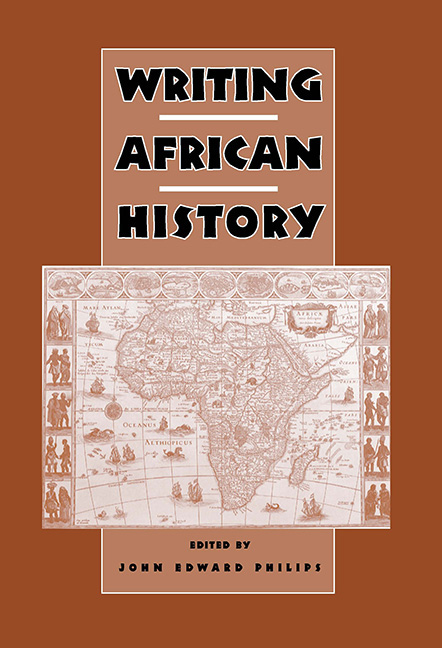Book contents
- Frontmatter
- Dedication
- Contents
- Acknowledgments
- Introduction
- Part I Background
- Part II Sources of Data
- Part III Perspectives on History
- 11 Data Collection and Interpretation in the Social History of Africa
- 12 African Economic History: Approaches to Research
- 13 Signs of Time, Shapes of Thought: The Contributions of Art History and Visual Culture to Historical Methods in Africa
- 14 Methodologies in Yorùbá Oral Historiography and Aesthetics
- 15 Local History in Post-Independent Africa
- 16 Africa and World-Systems Analysis: A Post-Nationalist Project?
- 17 “What Africa Has Given America”: African Continuities in the North American Diaspora
- 18 History and Memory
- 19 Writing About Women: Approaches to a Gendered Perspective in African History
- Part IV Conclusion
- Contributors
- Index
- Miscellaneous Endmatter
18 - History and Memory
from Part III - Perspectives on History
Published online by Cambridge University Press: 11 May 2017
- Frontmatter
- Dedication
- Contents
- Acknowledgments
- Introduction
- Part I Background
- Part II Sources of Data
- Part III Perspectives on History
- 11 Data Collection and Interpretation in the Social History of Africa
- 12 African Economic History: Approaches to Research
- 13 Signs of Time, Shapes of Thought: The Contributions of Art History and Visual Culture to Historical Methods in Africa
- 14 Methodologies in Yorùbá Oral Historiography and Aesthetics
- 15 Local History in Post-Independent Africa
- 16 Africa and World-Systems Analysis: A Post-Nationalist Project?
- 17 “What Africa Has Given America”: African Continuities in the North American Diaspora
- 18 History and Memory
- 19 Writing About Women: Approaches to a Gendered Perspective in African History
- Part IV Conclusion
- Contributors
- Index
- Miscellaneous Endmatter
Summary
I would like to discuss the relationship between history and memory in the Democractic Republic of the Congo. African history in general, and Congolese history in particular, are problematic as much in their reconstruction as in their interpretation. History and memory, in my opinion, each offers help to the other. History can be reconstructed thanks to memory, among other things, and memory in turn can be better interpreted thanks to history.
The connection between history and memory has already been the object of numerous scientific studies, unnecessary to mention here. The union of history-memory is significant in the reconstruction of what has gone before. Official history, faithful servant of current political institutions, omits certain facts, or falsifies past events, to legitimize power: the domination of one people by another, the occupation and exploitation of a territory by those who are strongest. In South Africa, for example, European settlers have created a history to legitimize the taking of almost all land, to the detriment of black Africans. Even more dependent on source materials than the craftsman is on the model, history is partial, relative, and fragile to the extent that its recovery is political.
Thus, I share the point of view of Pierre Salmon, according to whom, “la perception des faits n'est jamais parfaite; la transmission des faits est infidèle et la sélection des faits entraîne une déformation systématique de la vérité. Il s'ensuit que notre connaissance est inexacte, incomplète et superficielle” [the perception of facts is never perfect; the transmittal of facts is unreliable, and the selection of facts entails a systematic distortion of the truth. It follows that our understanding is inexact, incomplete, and superficial].
A concern for historical truth leads the searcher beyond the written word to other sources, especially archeology, oral tradition, memory, and so on. As was emphasized so effectively by Bogumil Jewsiewicki and Valentin Yve Mudimbe, “There, as in other places on the planet, Africans tell, sing, produce (through dance, recitation, marionette puppets, and so forth), sculpt, and paint their history.” These various sources bring to history some pieces of information without which the historic past cannot be fully reconstructed.
Memory reveals a solution to the difficulties of the historian in the sense that it offers a raw material for the rewriting of history after achieving a better understanding of the experience of the participants themselves.
- Type
- Chapter
- Information
- Writing African History , pp. 439 - 464Publisher: Boydell & BrewerPrint publication year: 2005

